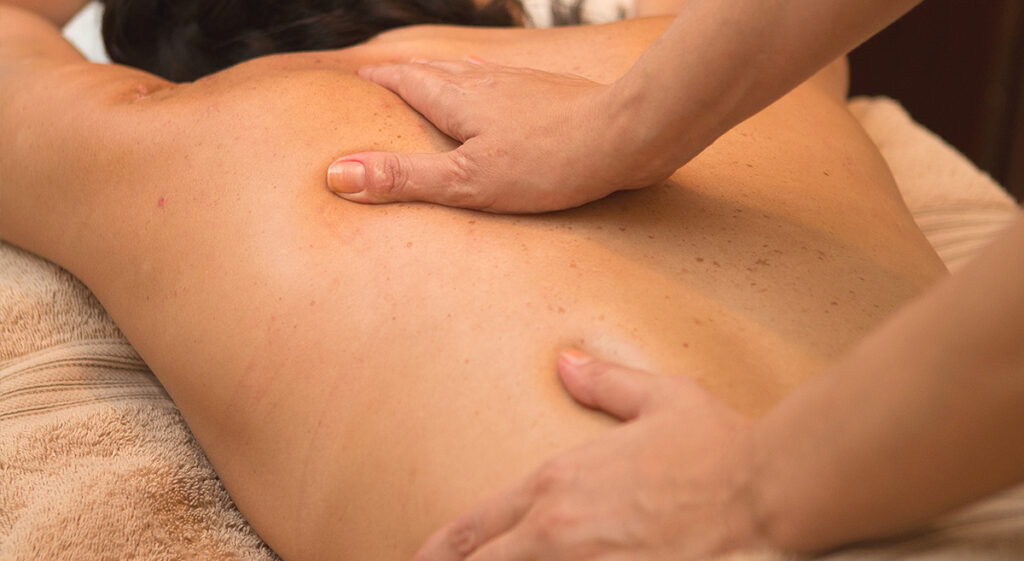As a woman, sooner or later we will have to deal with it: the menopause. For one is it pretty easy peasy, so to speak, the other can have serious symptoms for years, both physically and emotionally. And this can really have a huge effect on your daily life.
These hormonal shifts can cause you to suffer from hot flashes, insomnia, mood swings and muscle pain, for example.
But did you know that a massage can play a very supportive role in this?
While a massage can’t stop the underlying hormonal changes, it can help relieve certain symptoms and promote your overall well-being.
6 reasons why massage is good for you during menopause:
Reduction of hot flashes:
A massage cannot eliminate the hormonal causes of hot flashes, but it can help reduce their frequency and intensity. A massage brings the nervous system more to rest and contributes to regulating body temperature.
Stress Reduction:
Hormonal fluctuations and other physical and emotional changes can cause stress. A massage can reduce the production of stress hormones, such as cortisol, giving you a calming effect.
Improving night's sleep:
Many women experiences sleeping problems during menopause, such as insomnia and/or waking up several times during the night. Because massage provides more relaxation and reduces stress, it can contribute to a better night’s sleep. This will also make you feel less tired during the day.
Relief of muscle and joint pain:
You can also experience muscle and joint pain during menopause, again caused by hormonal changes and reduced estrogen production. A massage can help relax tense muscles, improve blood circulation to the joints and reduce pain. As a result, you will experience more relief from these symptoms and your overall mobility will also improve.
Emotional support:
As if physical symptoms weren’t difficult enough, many women also experience emotional challenges during menopause, such as mood swings, anxiety, and even depression.
Massage releases endorphins, the ‘happy hormone’, which can help reduce anxiety and improve your mood. In addition to relaxing your body and muscles, a treatment has a positive effect on your mental health.
Time and attention for yourself:
By taking a wellness treatment, such as a massage, you give yourself a moment to really have time for yourself and pay attention to your body and mind. Self-care is important for everyone, of course, especially if you have certain challenges in your life. Menopause is a phase where you may be experiencing all sorts of changes and is not something to ignore or fight against. That’s why it’s good to pamper yourself. A massage helps you not only to relax, but also to recover, to increase your awareness and perhaps also to gain more insight into yourself.
All in all, a massage is supportive when you are in menopause, physically and mentally and improves your overall sense of well-being.
Customized massage during menopause
A good massage is always beneficial. Still, it is an idea if you book a massage somewhere to ask your therapist whether the treatment can be individually adjusted if you have menopause symptoms.
My massages are always tailor-made for everyone, menopause or not. And especially with menopausal complaints, the treatment is adapted to your specific symptoms and your needs. This can even be different per session. A treatment can, for example, consist of a combination of lymphatic drainage and intuitive deep relaxation massage
If you have any questions or if you want to book a massage, you can contact me by email or call / app to +31 06 21566557
Currently I travel and work around Europe and Middle East. On my prices and locations page you will find when I am where.
Menopause and nutrition
Just a little bit about nutrition. If you have menopausal symptoms, you can also take a closer look at your lifestyle, including your diet. There are a number of things that you can change very well and easily yourself. Or, with the help of a specialized dietician, you can map out which food you should leave or take more of.
For example, consider:
- Less sugar, caffeine, salt and alcohol.
- Eat as much natural food as possible (so minimally processed food).
- More protein and fermented dairy, such as kefir.
- More fruit and vegetables, especially cruciferous vegetables (in pre-menopause).
- Food with a lot of omega 3 fatty acids such as fatty fish.
- More complex carbohydrates such as whole grains, legumes and vegetables.
- Foods high in magnesium, such as spinach, avocado, pumpkin seeds, cashews, almonds, brazil nuts, legumes, banana and salmon.
- You can also take additional supplements. It is advisable to check with a specialist which one, because too much of something can also not be good for you.
If you have very serious complaints or health problems, it is advisable to contact your doctor or other healthcare provider for any medication or other type of treatment.
Hi, my name is Jolinda, and I work as a holistic health practitioner. I provide yoga and meditation classes and massage and Reiki treatments, mindfulness training and happiness coaching,.
With my blogs I hope to inspire you to make positive changes into your life. For more ideas and tips check out my page Jolindas inspiration. Free trainings and videos you can find at free downloads and videos
Would you like to be kept informed and inspired? Then sign up for my newsletter.

